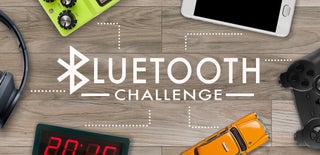Introduction: Building a Mini Bluetooth Speaker (with Powerfull and Clean Sound)
Hi guys this is my first instructable! :)
This project started when i bought the JBL Charge 2+. I was very pleased with the sound but i hate the compression at higher volumes with minor other flaws. After some tinkering i was sure one could build a better one. This instructable will be a buildlog. The speaker is not finished yet and will continue to be updated.
Ideas are welcome.
Step 1: Design
Where the JBL Charge 2+ failed this bluetooth speaker must succeed. I made a list:
- Two USB-C high output for charging mobile devices and future proofing
- High output power with no compression and nice sound signature
- Big battery
- Long range bluetooth receiption
- Scratch/splash resistant
- Same size
- Fast charging
- Speakers are fully covered
Step 2: First Try
I salvaged multiple 18650 batteries from an old laptop and made a 6s battery. This battery would be able to handle two TPA3118 chips down from 25,2v down to 15v where it could still deliver about 60w rms at 4 ohm(THD+N=1%) per channel. One might think that's too much but if you want to play loud without bass distortion it is recommended the amplifier has twice the power of the continues power of the speaker.
When you are using multiple batteries in series you should use a BMS. A battery management system prevents the battery from draining too far or charging to high. It also acts as fuse and makes sure all batteries are the same voltage. If you want to know more about a BMS google is your friend.
Music input would be from bluetooth or aux input. Some bluetooth music receivers on ebay provide external audio input. It switches automatically from bluetooth to aux when playing music.
Speakers are some cheap ebay speakers which had a big rubber surround and big magnet but after first look the suspension was very stiff. My expectations dropped.
First circuit dry run was a dissapointment. Why? The speakers are too stiff for bass reproduction. Also the amplifier chips have ALOT of noise. A simple resistor replacement would fix it but the music quality sucked too.
The enclosure failed too. I made it too small to fit all the components. I was inspired by the woodworking by "Kirby Meets Audio". Exotic wood was too expensive because my woodworking skills are zero. Vinyl is a cheap alternative. While it did looked nice the corners could tear or loose easily. I tried to fix it with wood finish but instead it dissolved the glue from the vinyl and everything came loose.
Step 3: Second Try
A new enclosure was made. The cheap 4cm speakers are replaced with 5cm speakers from parts-express. This time the speaker would have predicted performance. I chose for the Tectonic Elements TEBM35C10-4 BMR 2". It was cheap and had a frequency response from 100hz up to 20.000hz and very nice music directivity.
The battery was reused and i tried the amplifiers with a modification but came to the conclusion an all in one solution probably would work better. A TPA3110 with bluetooth would just fit. First power on was not what i expected. A chinese lady would welcome and tell the name of the device it has connected to. It was very bad. Sound quality was again a disaster. Also the speakers could not handle the power. Not much time later the thermal protection kicked in. This board was not able to be used at maximum volume for a long time. For fun i hooked it up on a roadtrip on two 12 inch speakers and boy it was loud. I'm impressed with these class-d chips.
Step 4: Modifications
The new enclosure was a succes. It provided to be very rigid with and without bracing while only being 5mm thick. Only the internals are going to be changed.
This is the latest amplifier i used: http://www.ebay.com/itm/2-x-8-Watt-Class-D-Blueto...
Only 2x8w? Wrong. The chip used is a TDA3110D2. Looking up the sheet is can provide 40w at 4 ohm(THD=1%@19v). That's still a lot of power when cooled properly. I removed some components and made a simple heatsink. It provided enough cooling to prevent thermal protection kicking in. (Bluetooth receiption became worse but this will be solved in the future)
The battery got revamped. Still 6 batteries but mounted at the back. More easily accessible for future repairs. The amplifier could not be used at higher voltages then 19v so a buck step up/down converter was used. First time i bought the wrong one which later on got replaced with the right one. (board with blue cap is old, board with black cap is new). Why is the black cap so big? Well, it is because without the bass will blow the 5a fuse i added to the circuit. (That's almost a 100w of power being used!)
Speakers are replaced again. After a lot of searching i found bigger vented speakers which will just fit.
Cables are replaced with thinner ones. The old cables are too big to be easy in use. Cables are recycled from an old ethernet cable.
Step 5: Future Modifications
With backplate the soundquality is a lot better. It goes very hard very easily. The speaker shakes a lot from the bass but the bass is not that very loud. My guess is the passive radiator is tuned too low. It weighs very heavy. My plan is changing the metal or 3D printing something. Vocals are okay. They sound muddy at high volumes and only nice when in ideal listening postion. Two 1 inch tweeters will be added to solve the problem. Using an EQ on your phone is no solution for me.
Bluetooth receiption will be improved by soldering an antenna and removing some space from the heatsink. The power led is going to be dimmed because it is very bright. I will update this instructable. Any ideas are welcome.
Step 6: Improving Bass and Bluetooth Performance
Using a less heavy passive radiator results in a higher tuning frequency. I replaced the metal with a thinner, lighter metal plate. The results are promising as you can see in the video. A mix of bass, distortion and air leaking.
The bluetooth receiption was very bad with the heatsink. Only a couple of centimeters or the connection was lost. I cut a square in the heatsink and added a 9cm wire to get a 12cm wire total (ideal length antenna for bluetooth band). I now have a solid connection over 5 meters with obstructions.
Because the bluetooth is onboard the amplifier no active filtering can be done. Only a passive filter will work. My plans are a LP filter for the big speaker to remove the muffled vocals and a HP filter and/or attenuator for the new 1 inch tweeters i ordered. I hope it will have better spatial sound. The tweeters will be installed floating on top of the existing speakers. It will be a tight fit.
Step 7: Bill of Material
On request of Spaltener i will add a bill of material with the parts i used so far. Last updated: 29-8-2017
https://docs.google.com/spreadsheets/d/1FKTp0rChrFuViZbbn2oMmtYs2f3lx_w8G-A8lKepVpk/edit?usp=sharing
Step 8: Sound Quality
The new tweeters didn't work out like i expected. They don't fit in the existing enclosure and when both used they don't sound that nice. I was dissapointed i had to make a new enclosure so i made a concept enclosure to test different speaker setups.
At this time i have around 5 passive radiators i could test. Strangely i found out that a passive radiator between the speakers works counter active. The bass gets cancelled. To prove this i added an experimental bass port at 75hz at the right side. The bass was a lot better. I don't know how the Bose Soundlink Mini isn't affected of this but that is a question for another time.
From all configurations i tested i liked this one the most:
- 2x 2 inch subwoofers with LP filter at 180hz
- 1x 2 inch BMR with HP filter at 180hz
- 1x 1 inch tweeter with HP filter at 850hz with 6ohm resistor for attenuation
- Bass port tuned at 75hz
The spatial is amazing because of the dispersion of the BMR. Vocals are very crisp and clean because of the tweeter and the bass is punchy without using an eq! I still have some stereo image because the BMR and tweeter are not connected on the same channel. For the third enclosure the design will be made first in SketchUp. I'm thinking of using acrilyc this time because i can cut it better in straight lines but we will see.
Step 9: Wiring Diagram
I made a wiring diagram for KristjanK3. This will not be the final version but i hope it helps.
Note: i'm still working on this project speaking of april 2018. I have made a new design but haven't finished it.

Runner Up in the
Bluetooth Challenge

Participated in the
First Time Author Contest













